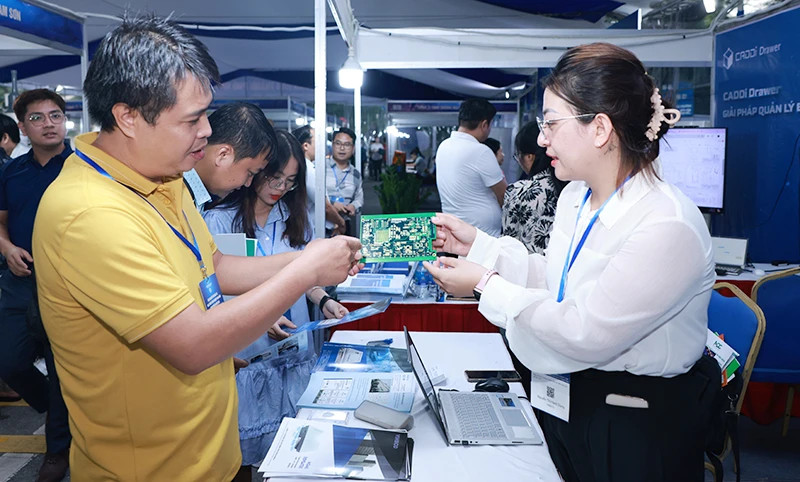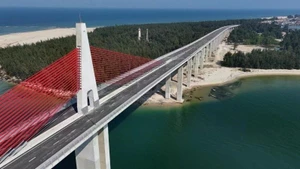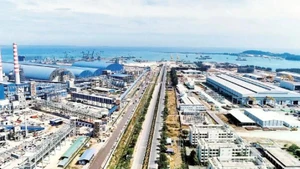According to the Ministry of Planning and Investment, since the beginning of 2024, FDI has concentrated on provinces and cities with strong infrastructure, stable labour force, administrative reform efforts, and dynamic investment promotion activities. Among these, Hanoi has consistently ranked among the leading localities in the country for attracting FDI.
A series of incentives and open mechanisms
Nearly a year after taking over the Hoa Lac Hi-Tech Park, Hanoi has been focusing on developing this technology hub into a hotspot for FDI in new and high-tech industries with great potential. The Hoa Lac Hi-Tech Park has attracted 109 investment projects (including 95 domestic and 14 foreign projects), with a total registered capital of approximately 115.5 trillion VND.
According to the Deputy Director of the Hoa Lac Hi-Tech Park Management Board Tran Dac Trung, the board focuses on creating a portfolio of projects to attract investment in necessary social infrastructure development. At the same time, they are actively proposing and developing appropriate mechanisms and policies to create the best conditions for investors. Many preferential policies are already in place for investors here, particularly for large-scale projects (with a total investment of over 4 trillion VND), which are now eligible for 30 years of corporate income tax incentives, instead of the previous 15 years.
Shortly, the Hoa Lac Hi-Tech Park is expected to become increasingly developed and attract more investors in high-tech industries. According to the plan, by 2027, the Korea Advanced Institute of Science and Technology (KAIST) will invest and support Vietnam in establishing a Semiconductor Research Lab located at the park, contributing to the sustainable development of the semiconductor technology industry in Vietnam.
The Hanoi Supporting Industries Business Association (HANSIBA), N&G Group, and 10 member companies of the Kobe Regional Aerospace Industry Network (Japan) signed a cooperation agreement to establish the Vietnam-Japan Techno Park Complex at the Southern Hanoi Supporting Industries Park in February. This complex offers opportunities for Japanese and Vietnamese businesses to collaborate in producing next-generation, high-tech supporting industry products, such as electrical equipment and precision mechanical devices, to serve the aerospace industry.
To support Japanese businesses and investors at the Southern Hanoi Supporting Industries Park, the Government and the Hanoi Municipal People's Committee have introduced special mechanisms. Specifically, projects producing priority supporting industry products, such as electronics, mechanical engineering, and automotive components, are offered land leases for up to 70 years. Additionally, they are granted corporate income tax incentives for 15 years, with a 100% corporate income tax exemption during the first four years.
According to the Hanoi Municipal Department of Planning and Investment, in the first seven months of 2024, the city attracted 1.3 billion USD in FDI, a 65% increase compared to the same period in 2023. Specifically, 143 new projects were registered with a total capital of 1.1 billion USD, 102 projects saw capital increases amounting to 138 million USD and 118 foreign investors contributed capital or purchased shares, totalling 77 million USD.
The sector attracting the most investment was real estate, followed by manufacturing, trade, services, construction, and science and technology. Among the notable projects, the Lumi Hanoi apartment complex on Thang Long Boulevard in Nam Tu Liem District, invested by Capital Land Group (Singapore) with 662 million USD, stands out as one of the largest foreign investments registered in Vietnam since the beginning of 2024.
Seizing opportunities to accelerate growth
Director of Hanoi Promotion Agency Nguyen Anh Duong said the city is committed to providing the most favourable conditions to attract investment, especially FDI. In addition to the existing general incentives, the new Capital Law introduces additional preferential mechanisms and attractive policies for investors.
For example, businesses investing in sectors designated as "priority for attracting strategic investors" will benefit from a 10-year exemption from land and water surface lease fees, with a 50% reduction on the remaining lease period. Additionally, they will enjoy a 5% corporate income tax rate, with a 4-year exemption and a 50% reduction on the remaining tax for the following 9 years.
In 2024, Hanoi aims to attract approximately 3.15 billion USD in FDI, with projects involving land usage accounting for over 2.15 billion USD and trade and service projects around 1 billion USD. For 2025, the city plans to attract about 2.7 billion USD in FDI. To achieve these targets, Hanoi needs to further enhance its investment attraction efforts, as there are still barriers that cause hesitation among foreign investors.
During a meeting with Hanoi’s leaders, the President of the Asian Infrastructure Investment Bank (AIIB) Jin Liqun expressed the bank’s interest in exploring cooperation opportunities in the capital and readiness to become a reliable partner for a long-term collaboration. However, he also recommended that Hanoi should simplify administrative procedures to maximise cost efficiency and operational performance, and emphasised that projects should be well-designed, swiftly implemented, and completed on time.
Associate Professor Dr Tran Dinh Thien, former Director of the Vietnam Institute of Economics, suggested that amid the FDI shift to Southeast Asia, Hanoi needs to focus on training and developing a high-quality workforce to access advanced technology and meet the requirements of FDI businesses.
Leaders of ministries such as Finance, Planning and Investment, and Science and Technology also affirmed their commitment to actively cooperate with Hanoi to implement the 2024 Capital Law and develop specific mechanisms and policies to attract major investors.
Recently, the Hanoi Municipal People's Committee has directed relevant departments and units to propose and organise efforts to attract investors for projects listed in the first phase of the Hanoi Investment Attraction Project List for 2024. This includes reviewing and preparing conditions related to land, infrastructure, and labour, to be ready for welcoming large investors and corporations. The city also emphasises upgrading industrial infrastructure to enhance competitive advantages for medium and long-term investment attraction.
The city has instructed agencies and units to strengthen the capacity of implementing officials, focusing on administrative reform and improving the administrative apparatus to better serve citizens and businesses. It is important to handle investment and business procedures promptly following legal regulations and avoid imposing inappropriate requirements or conditions during administrative procedures.
Hanoi is preparing to hold a dialogue conference with foreign investors, one of six specialised business dialogue meetings scheduled for 2024. This aims to promptly listen to and address challenges faced by FDI businesses.
Chairman of Hanoi Municipal People’s Committee Tran Sy Thanh emphasised that the city will focus on refining mechanisms and policies for the capital’s development. They will expedite the implementation of the amended Capital Law and develop specific policies related to urban governance, decentralisation, talent attraction, and high-quality human resource development. This approach aims to not only improve management and operational efficiency but also create favourable conditions for attracting investment resources, and promoting comprehensive and sustainable development.
















